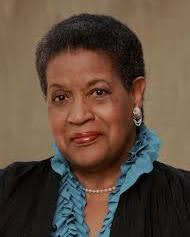 Myrlie Evers-Williams said she believes HBCUs can continue to recruit other groups “while not forgetting who we are or where we come from.”
Myrlie Evers-Williams said she believes HBCUs can continue to recruit other groups “while not forgetting who we are or where we come from.”LORMAN, Miss. — A groundbreaking conference at Alcorn State University turned into the first of what may become an annual brainstorming session on diversity at historically Black institutions. Just before the Diversity and Inclusion Summit on HBCUs ended Monday, its organizer, Dr. Derek Greenfield, announced that Alcorn would be partnering with Tennessee State University to hold the event next year on TSU’s campus in Nashville.
The announcement came after a second day of intense discussions that honed in on some of the specific problems of diversity — problems related to race, class, culture, gender and sexual orientation. After an initial day of polite conversation on Sunday, the gloves came off on Monday, and emotions sometimes ran high as participants expressed their views and personal experiences.
An underlying theme emerged: how to achieve greater diversity at HBCUs without losing the focus of educating and nurturing African-American students in a socially conscious environment.
Guided by an inspirational address from Myrlie Evers-Williams, reflecting on her experience of attending Alcorn after being rejected by two segregated White institutions in the state, despite having top academic qualification, the summit participants wrestled with issues of reaching out to other populations while preserving the rich heritage of HBCUs and coping with limited resources.
Evers-Williams, Alcorn’s distinguished scholar-in-residence and widow of slain civil rights activist Medgar Evers, came out unequivocally on the side of diversity at HBCUs, suggesting in her keynote address that because of our own civil rights struggle, African-Americans should be concerned with “humanity.” She asked: “Do we open the doors for others to come in? How much are we building into our young people, how much knowledge of humanity; are we doing the best we can to reach out to others regardless of race, religion or color?” Evers-Williams said she believes HBCUs can continue to recruit other groups “while not forgetting who we are or where we come from.”
There was not unanimity on the subject of preserving the core mission of HBCUs, however. Dr. Kevin Rome, vice chancellor of student affairs at North Carolina Central University and newly appointed president of Lincoln University of Missouri, said, “Maybe it’s time for us to relook at our core missions and to ask [if] those missions still work for the institutions. Maybe that core needs to change.” Rome said it may be time to consider framing a new question, “How do we continue to remain relevant to the students we now have coming to our campuses?”
Several presenters suggested that the “relevance” should extend to the increasing number of LGBT students on HBCU campuses. Kisha Webster, associate director of the Washington D.C-based Human Rights Campaign Foundation, said HBCUs have been slow to include sexual orientation in their anti-discrimination policies, leaving LGBT faculty and students without the same protections granted to others.
Some of the students who attended the conference stressed the need for more discussion about LGBT issues — and including LGBT students in those discussions — during freshman orientation. Alcorn State University has been in the forefront of inclusion in a monthly series of discussions called “diversity dialogue.” It was one of the best practices mentioned during the summit.
Evers-Williams told the group that their conversations — and disagreements — represented progress. “Some see diversity as a positive and some see it as a negative, and some would not like to talk about it at all,” she said. “But only in finding common ground can we move forward.”















